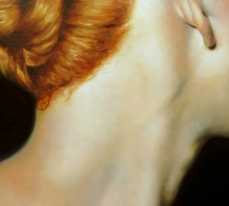A Review by Lindsey and Emily, Editors of Minerva Rising
Through her twenty-one poems that reticulate like stepping stones on a snaky garden path, Shannon Elizabeth Hardwick guides her readers through one woman’s version of Gethsemane. Amid vivid images of lush groves, flowing rivers, and rows of figs and flowers, we encounter Francine. Hardwick’s vision of Francine’s outlook is so cohesive in these pages that after reading them, I began to see myself as Francine. I looked up from the book, blinked and had to ask myself, And now what would Francine want to order in this cafe, how would she write this rain, how would she see these trees outside the window?
Francine in the Garden reads as a confessional, the lines pouring forth with raw emotion. Hardwick handles her frequent shifts between structured verse and prose poems, between third person and first person narration with deftness and grace. The poems are at times melancholy, imagistic, more magic than real, more holy than sanctified, in the way that the dead are holy, a grove “of oranges as oranges” are holy, “and a father to tend to them while I catch fish” (“Francine Creates Her Story As If Asked to Author Her Own Birth“).
There are meditations here: on the nature of sorrow and the capacity of a person to save herself from drowning in the current of her grief. On rivers and a farm in Missouri and a “certain sadness about the sale of Christmas trees.” Francine is not immune; she opens her heart to buffalo as she “opens windows/ when the fighting happens. . . [her] body needs to let in colors” (“Francine Reads Her Mother’s Etiquette Books After He Bust Her Ear Drum“).
The finest introspective poetry allows us, to paraphrase Eliot, to arrive back where we started and know the place for the first time. Some of the finest pieces in this collection are circular in the best, ouroboros, labyrinthine kinds of ways. “Francine Feeds Figs to Seals in the Sea of Mercy” and “Francine Creates Her Own Story As If Asked to Author Her Own Birth” both begin and end with the same lines. And in between lie the justifications for using the same lines as openings and closings. Many phrases throughout the collection hearken back to each other, and with each reiteration we see new meaning; we clarify, we deepen, we arrive, we know this place, this Francine’s garden, because we now live here too.
Francine views the natural world as an answer, grounds where a type of organic therapy takes place, the yin and yang of conception and decomposition, a place of “destruction and healing.” The garden is metaphor for a rich and fecund inner life. The waxing and waning of Francine’s torment are mirrored in the landscape around her and within her. Confusion and clarity are translated to, and illuminated by, nature. And in “Francine Hangs Lines of Trout Where There Should Be Laundry,” bodily metaphors are extended out beyond the garden:
Her heart, a trout. . . And a garden is a body. And a staircase is a
body. And a river off course, of course, is a body. . . . And light is
a body. . . And a river is a body.
This book is a book within a book. Francine’s reflections are woven with emotion – loneliness and longing for a home “to feel whole.” She recognizes the burden of memories: “Francine understands memories are stones, some heavier than others, some shinier, too, but all are for the pocket.” We carry these feelings around, we finger them like talismans, recite them like lines of poetry. And, like Francine, eventually we end up with hope of discovering our own grace in a graceless world – “the revival is not a tented thing / it is always inside us.”
In “Herself a Sea,” Hardwick’s heroine writes that “this is Mercy… to feel unknown drowning, knowing. Francine sees dark beneath her. Francine begins to believe her power.” This is the power of poetry, to feed us figs when we didn’t know we craved them, to “plant lines of figs to let in light” before we even realized we had been fumbling around in an overgrown backgarden, “never a shadow in the hedge.”
Though the book moves toward an unsettling conclusion, the realization that “We are/ two places, the living, the dead,” it is also clear that, like Francine in “Nightmares Are One Way to Feel,” we have no choice but to “let the world listen, let her in.”
As Hardwick suffuses Francine’s garden with the visual expediency of readily conjured images and emotionally resonant themes, these gorgeous poems prove, to quote Francine one final time, “There’s no question of the forever of grace. “ Let us leap to reap the gracious harvest of what this able poet has sown.
Shannon Elizabeth Hardwick received her MFA from Sarah Lawrence College. Her manuscript was a finalist for the Levis Prize in poetry and she is an associate poetry editor for The Boiler Journal. Her work has appeared in the following: 3:AM Magazine, Night Train, Versal, Sugar House Review, Four Way Review, among others.
You can purchase a copy of Francine in the Garden through Thrush Press at http://www.thrushpress.com/our-chapbooks.html.



